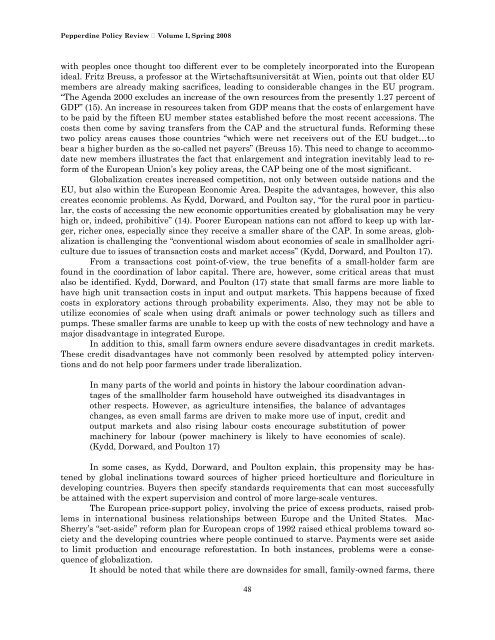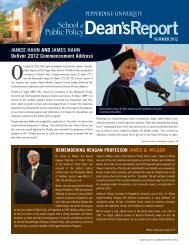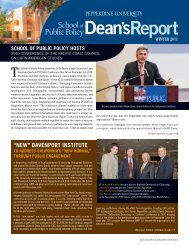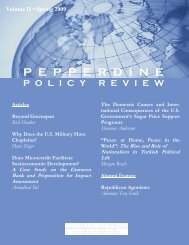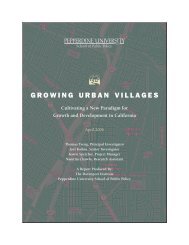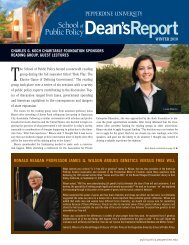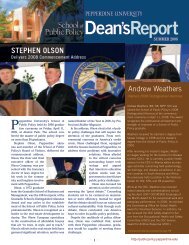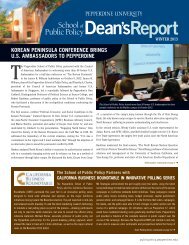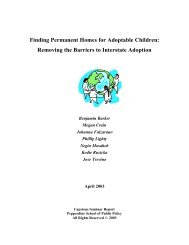Pepperdine University School of Public Policy
Pepperdine University School of Public Policy
Pepperdine University School of Public Policy
Create successful ePaper yourself
Turn your PDF publications into a flip-book with our unique Google optimized e-Paper software.
<strong>Pepperdine</strong> <strong>Policy</strong> Review Volume I, Spring 2008<br />
with peoples once thought too different ever to be completely incorporated into the European<br />
ideal. Fritz Breuss, a pr<strong>of</strong>essor at the Wirtschaftsuniversität at Wien, points out that older EU<br />
members are already making sacrifices, leading to considerable changes in the EU program.<br />
“The Agenda 2000 excludes an increase <strong>of</strong> the own resources from the presently 1.27 percent <strong>of</strong><br />
GDP” (15). An increase in resources taken from GDP means that the costs <strong>of</strong> enlargement have<br />
to be paid by the fifteen EU member states established before the most recent accessions. The<br />
costs then come by saving transfers from the CAP and the structural funds. Reforming these<br />
two policy areas causes those countries “which were net receivers out <strong>of</strong> the EU budget…to<br />
bear a higher burden as the so-called net payers” (Breuss 15). This need to change to accommodate<br />
new members illustrates the fact that enlargement and integration inevitably lead to reform<br />
<strong>of</strong> the European Union’s key policy areas, the CAP being one <strong>of</strong> the most significant.<br />
Globalization creates increased competition, not only between outside nations and the<br />
EU, but also within the European Economic Area. Despite the advantages, however, this also<br />
creates economic problems. As Kydd, Dorward, and Poulton say, “for the rural poor in particular,<br />
the costs <strong>of</strong> accessing the new economic opportunities created by globalisation may be very<br />
high or, indeed, prohibitive” (14). Poorer European nations can not afford to keep up with larger,<br />
richer ones, especially since they receive a smaller share <strong>of</strong> the CAP. In some areas, globalization<br />
is challenging the “conventional wisdom about economies <strong>of</strong> scale in smallholder agriculture<br />
due to issues <strong>of</strong> transaction costs and market access” (Kydd, Dorward, and Poulton 17).<br />
From a transactions cost point-<strong>of</strong>-view, the true benefits <strong>of</strong> a small-holder farm are<br />
found in the coordination <strong>of</strong> labor capital. There are, however, some critical areas that must<br />
also be identified. Kydd, Dorward, and Poulton (17) state that small farms are more liable to<br />
have high unit transaction costs in input and output markets. This happens because <strong>of</strong> fixed<br />
costs in exploratory actions through probability experiments. Also, they may not be able to<br />
utilize economies <strong>of</strong> scale when using draft animals or power technology such as tillers and<br />
pumps. These smaller farms are unable to keep up with the costs <strong>of</strong> new technology and have a<br />
major disadvantage in integrated Europe.<br />
In addition to this, small farm owners endure severe disadvantages in credit markets.<br />
These credit disadvantages have not commonly been resolved by attempted policy interventions<br />
and do not help poor farmers under trade liberalization.<br />
In many parts <strong>of</strong> the world and points in history the labour coordination advantages<br />
<strong>of</strong> the smallholder farm household have outweighed its disadvantages in<br />
other respects. However, as agriculture intensifies, the balance <strong>of</strong> advantages<br />
changes, as even small farms are driven to make more use <strong>of</strong> input, credit and<br />
output markets and also rising labour costs encourage substitution <strong>of</strong> power<br />
machinery for labour (power machinery is likely to have economies <strong>of</strong> scale).<br />
(Kydd, Dorward, and Poulton 17)<br />
In some cases, as Kydd, Dorward, and Poulton explain, this propensity may be hastened<br />
by global inclinations toward sources <strong>of</strong> higher priced horticulture and floriculture in<br />
developing countries. Buyers then specify standards requirements that can most successfully<br />
be attained with the expert supervision and control <strong>of</strong> more large-scale ventures.<br />
The European price-support policy, involving the price <strong>of</strong> excess products, raised problems<br />
in international business relationships between Europe and the United States. Mac-<br />
Sherry’s “set-aside” reform plan for European crops <strong>of</strong> 1992 raised ethical problems toward society<br />
and the developing countries where people continued to starve. Payments were set aside<br />
to limit production and encourage reforestation. In both instances, problems were a consequence<br />
<strong>of</strong> globalization.<br />
It should be noted that while there are downsides for small, family-owned farms, there<br />
48


